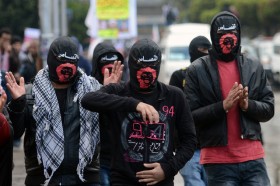 Perched on a rooftop, his face concealed by a black mask, an Egyptian anarchist lobbed a firebomb at the headquarters of the Muslim Brotherhood in the name of a “second revolution.”
Perched on a rooftop, his face concealed by a black mask, an Egyptian anarchist lobbed a firebomb at the headquarters of the Muslim Brotherhood in the name of a “second revolution.”
Down at street level, the Brotherhood — the Islamist organization from which President Mohamed Mursi hailed — was waiting. Supporters including Abdel Rahman el-Beyaly had gotten wind of the plan in March to target the group’s Cairo office, and headed there to defend it. “After burning offices, they will go one step further,” el-Beyaly said.
That same month, hundreds of miles south along the Nile in Assiut, the Gamaa Islamiya, a once-violent Islamist group, was signing up volunteers for “popular committees” whose job, it said, would be to keep order. The plan sparked fears, especially among the city’s Christians, that the committees may evolve into a front for Islamist vigilantism.
Two years into the polarizing transition from the rule of deposed President Hosni Mubarak, political movements in Egypt have shown a growing willingness to confront opponents with force or take the law into their own hands. With security weakened, the concern is that there will be no effective authority to stop them.
‘Conflict and Chaos’
“The inherent risk is that the state is eroding and the alternatives that are emerging are steeped in conflict and chaos,” said Ashraf el-Sherif, a political science lecturer at the American University in Cairo. “Part of the agenda of some of these groups is to deter other political groups, so the possibility of a confrontation becomes real.”
Areas around Brotherhood offices and the presidential palace have at times turned into battlegrounds. Scenes of civilians pelting each other with rocks or firebombs have become commonplace since the ouster of Mubarak, who would jail protesters and political opponents such as Brotherhood members.
The turmoil has hobbled attempts by Mursi to secure a $4.8 billion International Monetary Fund loan he says is crucial to getting Egypt’s economy back on track. Political bickering and unrest have prompted successive governments to back off from initial IMF accords, on concern the austerity measures required would fuel the unrest.
Economic Pain
The economy has been growing at the slowest pace since 1992. It will expand 1.4 percent this fiscal year, according to estimates from analysts at HSBC Holdings Plc. The pound has slid 8.6 percent this year and yields on benchmark dollar bonds maturing in 2020 have jumped more than a percentage point to about 7.3 percent.
Prime Minister Hisham Qandil said restoring security was key to reviving investment and tourism, according to a statement from his office yesterday. He expressed support for police as they face political unrest that’s part of “the nature of the transitional period” after the revolt.
Divisions deepened after Mursi sought to widen his powers in November, provoking accusations he and the Brotherhood were trying to consolidate power rather than address root causes of the uprising such as unemployment. Rival groups began to summon supporters onto the streets more often, and even when they called for peaceful rallies, the gatherings sometimes led to confrontation.
It was when Islamists descended on the palace in December and confronted activists staging a sit-in that the face-off escalated.
Beating ‘Deserved’
At least five people were killed that night. Ola Shahba, 34, says she was in the frontline of anti-Mursi protesters, ready to help treat injured colleagues. She says she was captured by a group of about 30 people led by Brotherhood supporters, and dragged to a kiosk where she was detained, groped and beaten.
“It took 15 minutes to get there, all the way they were beating me, with their hands and shoes, they choked me,” she said. “There were hands inside my pants, and my clothes got torn off. I was bleeding heavily and when someone tried to get me into an ambulance, another guy stopped him, and said I deserved to be beaten.”
Shahba, who said she voted for Mursi in last June’s presidential election, said a police officer stood by without intervening. She said she was released the next day after activists lobbied for her release. The Brotherhood, in a statement the next day, blamed the violence on “crowds of thugs armed with all kinds of firearms, knives and swords” engaged in a “vicious plot to overthrow the legitimate regime.”
